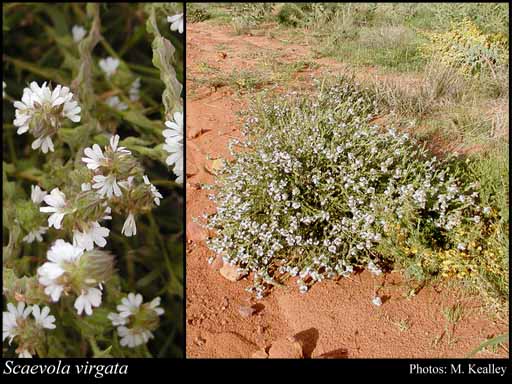- Reference
- Telopea 3: 501-502 (1990)
- Conservation Code
- Not threatened
- Naturalised Status
- Native to Western Australia
- Name Status
- Current
Spreading perennial, herb or shrub, 0.1-0.4 m high. Fl. blue-white, Jul to Nov. Sand, skeletal soils. Rocky hills & outcrops, plains.

Scientific Description
Stems unribbed. Leaves flat, 12-35 mm long, 2-5 mm wide, Indumentum present, with sparse, absent hairs; margins entire or toothed. Bracteoles present, 5-5.5 mm long, hairy, with glandular hairs. Pedicel pedicellate, Pedicel length the pedicels 2-3 mm long, Indumentum present, Hair type with glandular hairs. Calyx lobes present, Calyx length 4-6 mm long, hairy, with sparse, glandular hairs. Corolla white, 6-10 mm long, without auricles, not spurred, hairy on the outside, with sparse, simple hairs, hairy on the inside; central lobes 2.8-4.5 mm long, with wings; outer lobes 2.5-4.3 mm long, wings present on both sides, 0.3-0.6 mm wide. Anthers free. Ovary inferior, not gibbose; style 3-6.3 mm long, hairy; indusium single, hairy; ovules one or two. Flowers in July, August, September, October and November. Occurs in the Geraldton Sandplains (GS) and Avon Wheatbelt (AW) IBRA Region(s), of the South West (SW) Botanical Province.
Distribution
- IBRA Regions
- Avon Wheatbelt, Geraldton Sandplains.
- IBRA Subregions
- Geraldton Hills, Katanning, Lesueur Sandplain, Merredin.
- IMCRA Regions
- Central West Coast.
- Local Government Areas (LGAs)
- Carnamah, Chapman Valley, Coorow, Dandaragan, Goomalling, Greater Geraldton, Irwin, Moora, Northampton, Three Springs, Wongan-Ballidu.